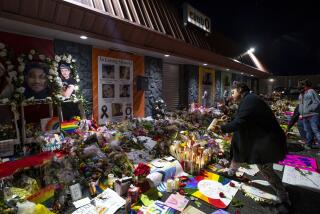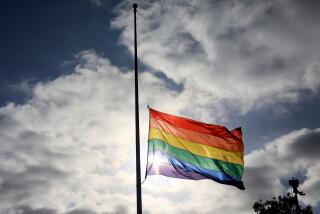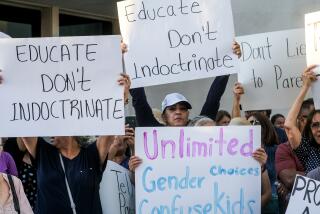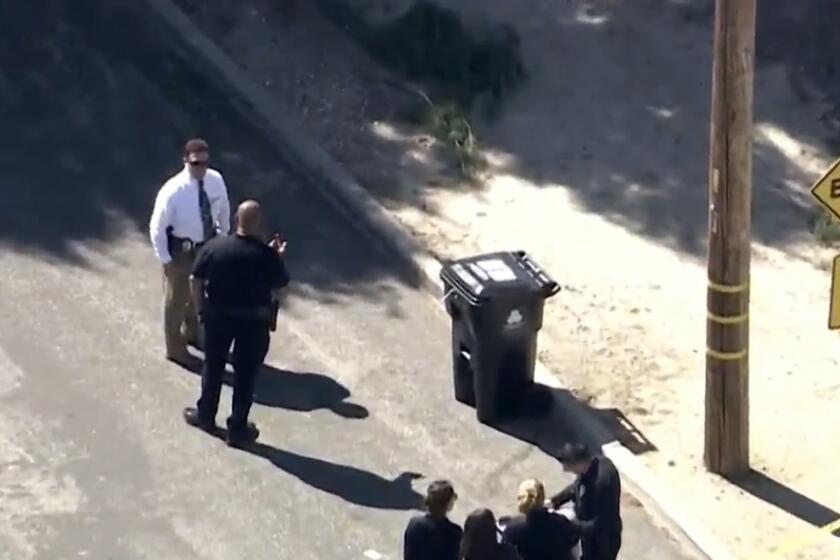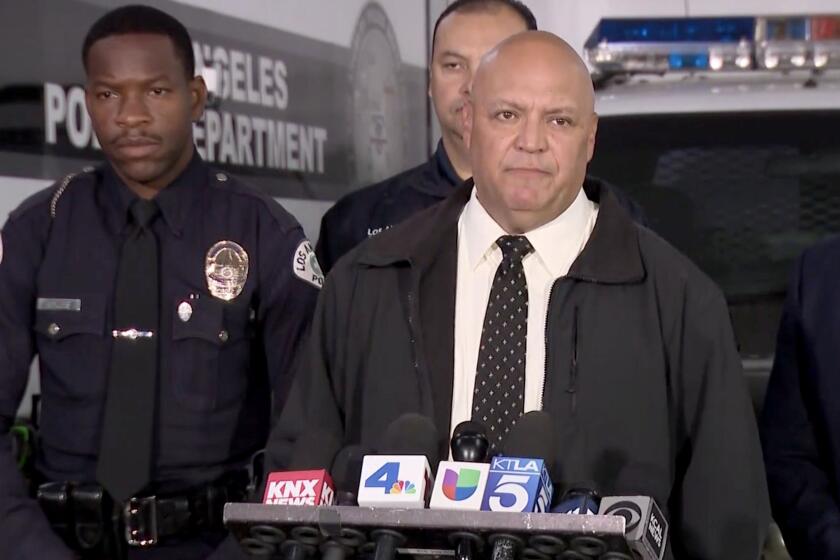Two mothers and a son at the center of a ‘straight pride’ culture war
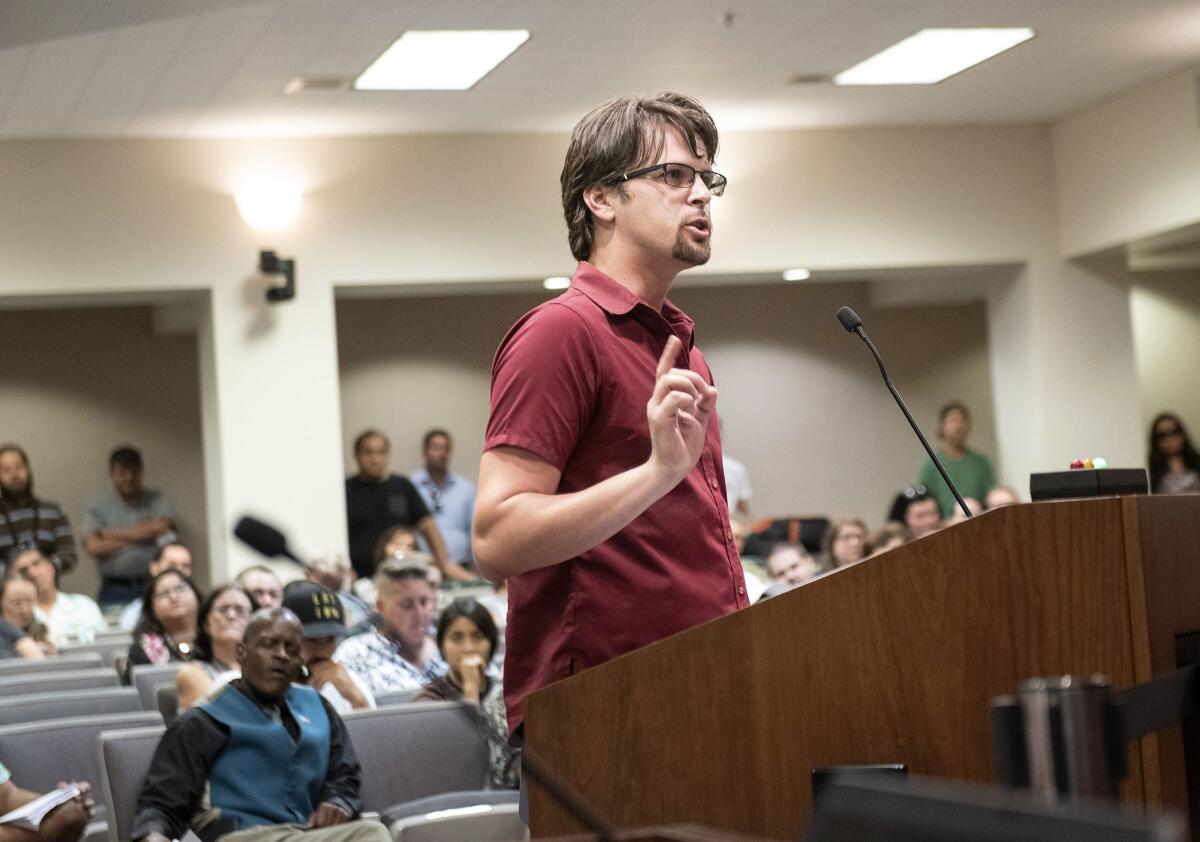
After a month of controversy that brought mass attention to a mid-sized Central Valley city, a planned “straight pride” event in Modesto went off with more of a whimper than a bang last Saturday.
Counter-protesters, who had organized a slate of diversity-affirming events for the weekend, dramatically outnumbered “straight pride” attendees, who — after failing to secure permits for their event — didn’t even announce the location until Saturday morning.
For weeks prior, the looming event had played out in the national press as a hot-button culture wars story, writ large.
But it was also, improbably, the story of three people: two mothers and a son caught in a strange trinity at the white-hot center of all of this.
Mylinda Mason, who lives in an American-flag festooned house on a quiet street in Modesto, was one of the main organizers of Modesto straight pride. Her adopted son, Matthew — whom Mylinda raised from birth, until she kicked him out of the house when he came out at 19 — emerged as one of the most outspoken critics of the event, helping to organize the opposition. And Matthew’s birth mother, with whom he reconnected as an adult, is one of the six members of Modesto City Council. Councilwoman Kristi Ah You was also vocal in her criticism of the straight pride event and what it represents.
Of course, Mylinda did raise Matthew to be an activist, albeit of a different sort.
“Every Wednesday we’d be out at the abortion clinic on Coffee Road,” Matthew said of his childhood. “Once we got a Planned Parenthood over on McHenry, we started protesting that one too.”
Matthew protested outside abortion clinics since before he can remember. (At Mylinda’s house, there is a picture of Matthew as a toddler, standing in the kitchen holding a red faux stop sign that says, “Stop Killing Babies!”)
When he was 12 or 13, Mylinda started taking him to the Bay Area in the family van to protest events like an annual gay prom.
“As a teenager, I’m growing up actively protesting against the LGBTQ community,” Matthew recalled. The message it sent him, he said, was that he should keep his mouth shut and conform to the mold of what he was supposed to be.
For Matthew, who is now 28, the internet provided an early form of relief and community as he tried to figure out his own identity. “I started meeting other people of different ideologies and meeting people who are gay and realized that, ‘Oh, they’re not demons, they’re humans,’” he said.
Matthew’s birth mother was not in his life while he was growing up. She left Modesto briefly to get a degree at the San Francisco College of Mortuary Science, then returned to work at a local funeral home, followed by 13 years at the Stanislaus County coroner’s office, where she rose through the ranks to eventually become chief deputy coroner. She was elected to the Modesto City Council in 2015 and is also the managing partner of a funeral home.
Mylinda reached out to Ah You after Matthew came out to her. “She called me, screaming and crying, and I was like ‘Oh, dear god, he’s either deceased or gay.’ ” Ah You recalled.
She then invited the son she hadn’t seen since he was a baby to meet for a coffee, and the two eventually grew close. Matthew told me that he calls Ah You “mama.”
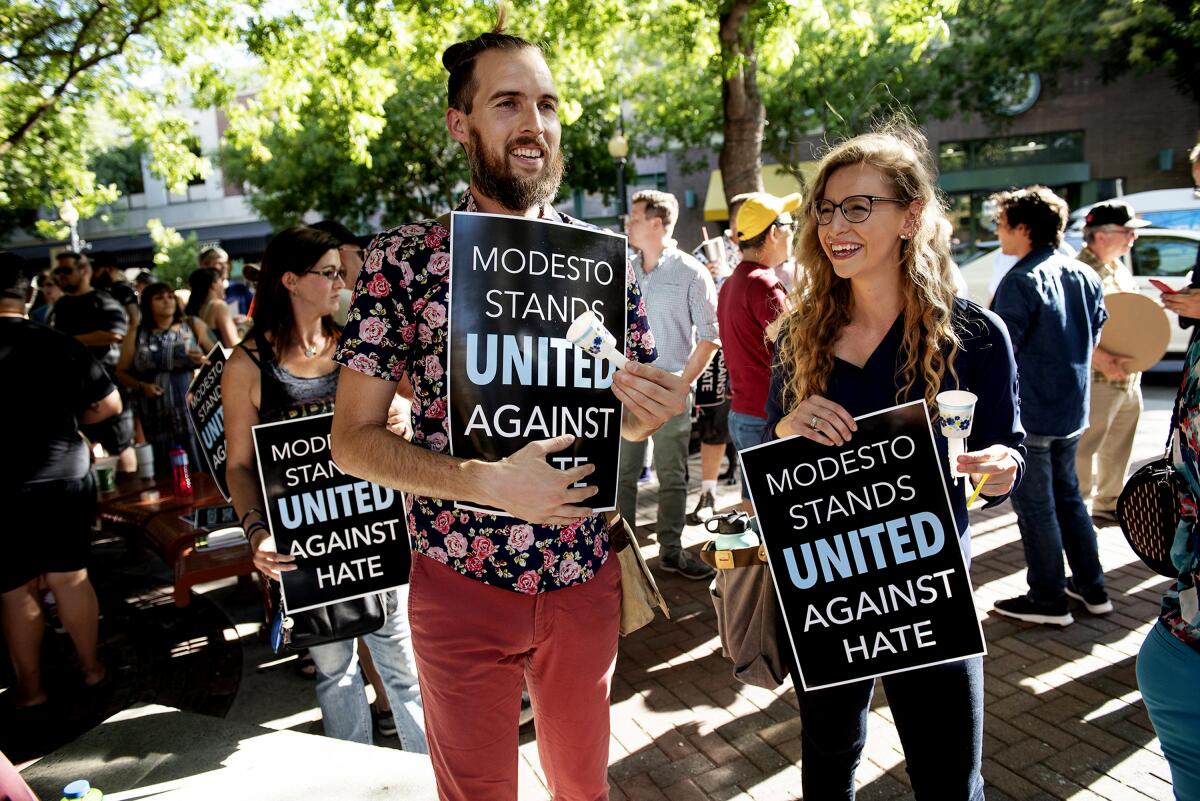
Sitting at Mylinda’s dining room table in Modesto, where a portrait of George Washington at the Battle of Trenton, made exclusively for Friends of the NRA, hangs above the piano between framed copies of the Declaration of Independence and the Bill of Rights, I asked Mylinda why she thought Modesto needed a celebration of straight pride.
She sighed. “Because we, again, watched all through June the sodomite community celebrate their lifestyle.”
She is, of course, referring to gay pride month — an event now so mainstream and marketable that everyone from Listerine to Budweiser put out limited-edition products to signal their allyship, and perhaps even make a buck in the process.
But rainbow corporatization aside, pride month has deeply radical roots, and remains a celebration of visibility for a long-marginalized group, for whom basic civil rights, equal protection under the law and treatment with full human dignity required a generations-long battle that is far from fully over.
And while gay pride events may be intended to gird against oppression, marginalization and invisibility, their stated purpose is certainly not to protect the populace from the inborn evil of straight people.
The converse, however, cannot be said for straight pride. The first paragraph of the “About” section on the National Straight Pride Coalition’s website describes defending children, and protecting current and future generations “from being destroyed by the inherent malevolence of the Homosexual Movement.”
And straight pride isn’t just about sexuality. In fact, the term has become a bit of a dog whistle for far-right groups, rising nationalism and white supremacy.
“A lot of the push back that I’ve been getting over the past couple of weeks is like, ‘Well, why are you fighting straight pride? Don’t they have the right to have their straight pride?’ ” Matthew explained.
“Well, yeah,” Matthew continued. “But that’s not what this is. This is white supremacy being wrapped up in a package of straight pride and people are just taking the package and taking the white supremacy that comes with it.”
The coalition’s website lists celebrating Caucasians as “the founders of Western civilization” as one of the movement’s tenets. (Mylinda’s co-organizer, National Straight Pride coalition founder Don Grundmann, went viral with an apparent gaffe while testifying at a city council meeting, where he declared that they were “a totally peaceful racist group.”)
Back in Mylinda’s dining room, her friend Bob Wiggs, a fellow straight pride organizer and the former owner of Bob’s Take-and-Bake Pizza in Modesto, has arrived and joined us at the table. Bob said that he didn’t have any animosity toward “these people” and that he actually treated “homosexuals” like any other customers when they came in to buy pizza from him.
Mylinda interrupted him. “Bob’s saying that because we have been accused of being white supremacist or racist or ridiculous other—”
“I am not a racist,” Wiggs interjected.
All reporters believe themselves to be objective gatherers of facts. We would like to say that we merely collect units of truth and stack them into place. But to really believe that anyone can organize sometimes opposing truths into logical shape without leaving fingerprints would require a not-very-reporterly suspension of disbelief.
The more complicated the story, the more choices we make. What details to include, what quotes, what phrasing, what order. It’s all a choice. Any kind of narrative, let alone a reported column, is the product of of too many decisions to count. And there is no possible end product that doesn’t oversimplify.
There is a version where I could underscore how genuinely gracious Mylinda was in welcoming me into her home, how difficult all of this publicity has been for her, how many hateful messages she has received, and how many times she offered me a piece of leftover birthday cake before I went out the door.
There is another version where I could cherry-pick only her ugliest words (“If you know anything about sodomy, people with sodomy end up with AIDS or they end up with HIV. … It’s a culture of death,” or the part where she suggested her son’s sexual orientation was the work of Lucifer, or the comments about the “perverseness” of the “homosexual movement”) out of the pages of transcripts, leaving no room to describe her pride as she showed me pictures and old writings of Matthew’s.
Or I could just leave it at this. Mylinda is someone who said many times how much she loves her son, but refuses to accept him for who he is. She is also someone who has lived her convictions to a degree that many would find unimaginable.
It is one thing to stand outside an abortion clinic once or twice a week with a sign. It’s quite another to tell a pregnant 19-year-old woman outside that same clinic that you will raise her child as your own and really mean it.
But that is the story of how Matthew came to be a Mason.
“For me, I am pro-life,” said Ah You. But she found herself in a difficult position nearly three decades ago, then still a teenager and taking an anti-seizure medication that her pharmacist didn’t know could cause birth control failures. Suddenly, she was pregnant. And then she was at the clinic. And then she asked to see the sonogram screen, and realized this was not a decision she could carry out.
She got dressed and left and drove around. “I remember I returned a casserole dish and I’m just like, huh, what am I going to do?” she recalled.
She returned to the clinic and started speaking to a protester outside. “That was Mylinda. She was wearing a red sweater and carrying some gross sign. It was horrible. But she offered to pray with me.”
The two women prayed together outside the clinic, and then Mylinda gave Ah You her phone number and told her that if she wanted to give her child up for adoption, Mylinda and her family would raise him. And that’s just what happened.
“She raised him. I don’t get to now step up with a scorecard on the kind of job she did,” Ah You said. She and Mylinda are both Christian Republicans, but, as Ah You put it, “we’re in the same Bible, but we’re definitely on a different page.”
The Friday night before the planned straight pride event, when it was still unclear just how many people would show up the next day, 250 Modestans holding little electric candles gathered for an interfaith vigil, to say there was no room for hate in their city. Ah You spent the service sitting by Matthew’s side.
“This is community right here,” she told the audience.
With the Essential California newsletter, you will get quickly up to speed on the stories shaping California — from our pages and beyond. You’ll also get original reporting and in-depth conversations on the issues that matter most. Delivered to your inbox, Mondays through Fridays, with a week in review on Saturdays. Sign up at latimes.com/essentialcalifornia.
More to Read
Start your day right
Sign up for Essential California for news, features and recommendations from the L.A. Times and beyond in your inbox six days a week.
You may occasionally receive promotional content from the Los Angeles Times.
